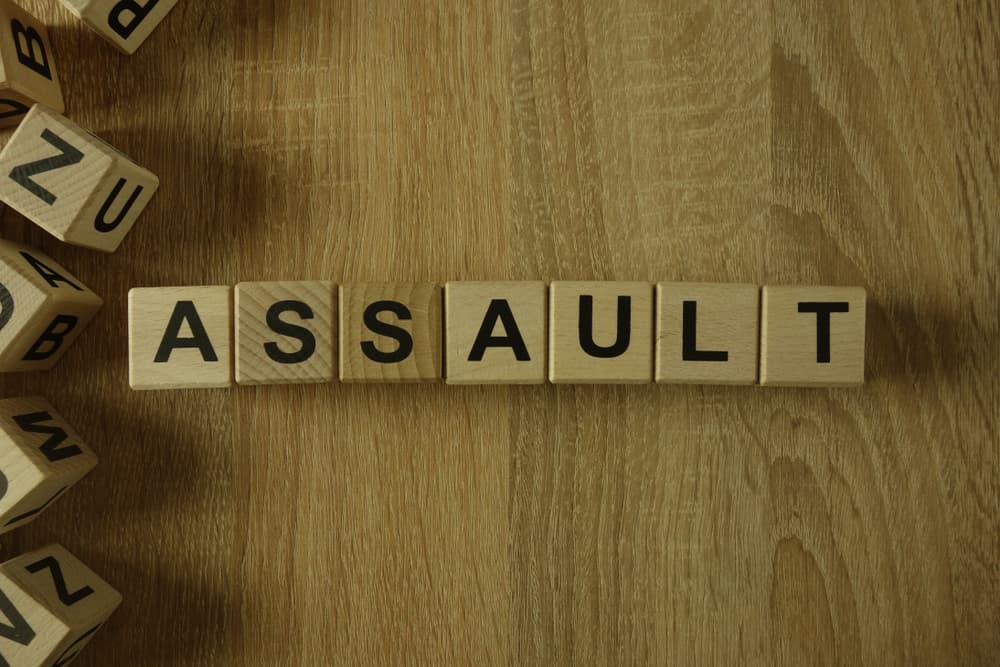A criminal conviction can lead to monetary fines, jail time, and other penalties. Moreover, an assault conviction may prevent you from contacting your children or other family members for a significant period of time. Given everything riding on the line, you need experienced legal counsel in your corner at every stage of your assault case – from your initial arrest up through trial.
A knowledgeable assault defense attorney can represent you during every stage of your case, negotiate with state prosecutors on your behalf, and if necessary, introduce strong legal defenses at your criminal court trial. Your lawyer will do everything possible to obtain a favorable result in your criminal court case.
Elements of an Assault Charge
Criminal assault is a serious offense. The law defines assault as intentionally causing or attempting to cause physical harm to another person. This can include hitting, punching, kicking, or even threatening someone with physical harm.
An assault conviction requires evidence that the accused intended to harm or put the victim in fear of harm. This means that accidentally bumping into someone or engaging in a heated argument without any intention of causing harm does not typically constitute an assault.
Another important element of an assault charge is the concept of consent. If the alleged victim consented to the actions that caused harm, the law may not consider it assault. However, “consent” obtained under duress or alcohol intoxication may not count.
Furthermore, prosecutors may charge you with aggravated assault if you allegedly used a deadly weapon, caused serious bodily injury, or assaulted certain protected individuals, such as police officers, emergency responders, or school employees.
Prosecutors can charge assault as either a misdemeanor or a felony, depending upon the severity of the offense and other circumstances. Misdemeanor assault charges typically involve less-serious injuries or actions, while prosecutors reserve felony assault charges for more serious cases involving significant harm or other aggravating factors.
In addition to criminal charges, individuals accused of assault may face civil liability for any injuries or damages caused. This means that the victim can pursue compensation through a civil lawsuit, in addition to any criminal penalties imposed by the court.
If you are currently pending an assault charge, a knowledgeable criminal defense attorney can go over your options with you and guide you throughout the criminal court process.
What Are the Potential Penalties for an Assault Conviction?
An assault conviction can result in significant penalties.
Misdemeanor assault convictions typically involve less-serious injuries or actions, with penalties including fines, probation, community service, and possibly a short jail sentence. The specific fines and jail time can vary depending on the circumstances of the assault and the offender’s prior criminal history.

For more serious assault cases – especially those involving aggravated assault or other aggravating factors (like the use of a deadly weapon or causing serious bodily injury) – individuals may face felony charges, which can result in longer prison sentences, higher monetary fines, and more stringent probation conditions.
In addition to criminal penalties, individuals convicted of assault may face civil liability for any injuries or damages they caused. This means that the victim can sue them in a civil court to recover compensation for medical expenses, lost wages, pain and suffering, and other damages.
Furthermore, a conviction for assault can have long-term consequences beyond just the immediate penalties that the court imposes. Having a criminal record for assault can make it difficult to find employment, housing, or obtain certain professional licenses in the future. It can also damage relationships with friends, family, and community members, and can result in social stigma and ostracization.
In some cases, individuals convicted of assault may qualify for alternative sentencing options, such as diversion programs or rehabilitation programs – especially if they have no prior criminal history, will take responsibility for their actions, and seek help to address any underlying issues that may have contributed to the assault.
A criminal defense attorney in your area may help you avoid these penalties and collateral consequences by avoiding an assault conviction in the first place. However, if you do obtain a conviction, your lawyer can represent you during your sentencing hearing and argue for the lightest possible penalty.
Legal Defenses to a Criminal Assault Charge
When facing a criminal assault charge, an accused individual (or defendant) may employ several legal defenses to challenge the accusations against them.
One common defense is self-defense. This defense asserts that the defendant acted in a manner necessary to protect themselves from imminent harm. To successfully claim self-defense, the defendant must demonstrate that they reasonably believed they were in danger of bodily harm or death, and that they took actions proportionate to the threat they faced.
Another possible defense is defense of others. Similar to self-defense, this defense argues that the defendant acted to protect another person from harm. Again, the defendant must show that they reasonably believed the other person was in danger and that the circumstances justified their actions.
Additionally, the defendant may argue that the alleged victim consented to the actions that led to the assault. This defense may work in cases where the alleged victim willingly participated in a physical altercation, such as mutual combat.
Another defense strategy is mistaken identity or misidentification. This defense asserts that the defendant was not the person who committed the assault, or that evidence does not prove – beyond a reasonable doubt – that the defendant was the perpetrator.
Furthermore, defense attorneys may challenge the prosecution’s evidence by arguing that the alleged assault did not meet the legal definition of the crime. For example, if the prosecution cannot prove that the defendant intended to cause harm or that their actions resulted in physical harm to the alleged victim, the court may dismiss the charges.
In some cases, defendants may also raise defenses based upon the circumstances surrounding the alleged assault. For example, if the defendant acted under extreme emotional distress at the time of the incident, their mental state may constitute a defense.
The effectiveness of these defenses can vary depending upon the specific facts of the case and the laws of the jurisdiction that tries the case. An experienced criminal defense attorney can determine the best defense strategy for their individual circumstances.
What Happens after an Arrest for Assault?
After a criminal assault arrest, a series of events unfold that lead up to a potential trial.
- Arrest – The process begins with the arrest of the suspect by law enforcement officers. This typically occurs if probable cause shows the suspect committed assault.
- Booking – After the arrest, police bring the suspect to a police station or jail for booking. During booking, police record their personal information, take fingerprints, and photograph them.
- Initial Appearance – Following booking, the suspect goes before a judge for an initial appearance. During this hearing, the judge informs the suspect of the charges against them, advises them of their rights, and may set bail or release conditions.
- Bail Hearing – If the suspect cannot post bail, they may request a bail hearing where the judge will determine whether to set bail and, if so, the amount.
- Pretrial Proceedings – In the time leading up to trial, pretrial proceedings may address motions filed by the defense or prosecution, such as motions to suppress evidence or dismiss charges.
- Discovery – Both the prosecution and defense exchange evidence through a legal process known as discovery. This allows each side to review the evidence they will present during trial.
- Plea Bargaining – In some cases, the prosecution and defense may engage in plea bargaining negotiations to resolve the case without going to trial. This can involve the defendant pleading guilty to a lesser charge in exchange for a lighter sentence.
- Trial Preparation – In preparation for trial, both the prosecution and defense will gather evidence, interview witnesses, and develop their case strategies.
- Jury Selection (if applicable) – If a jury will hear the case, both sides participate in the selection process to choose jurors who are fair and impartial.
- Pretrial Conference – Prior to trial, the judge may hold a pretrial conference with the prosecution and defense to discuss any outstanding issues and ensure that the case is ready for trial.
These steps culminate in the trial itself, where the prosecution presents its case, the defense presents its defense, and a judge or jury determines the defendant’s guilt or innocence, based upon the evidence presented.
What Happens at a Criminal Assault Trial?

During a criminal assault trial, the prosecution and defense present their cases to a judge or jury to determine the defendant’s guilt or innocence.
- Opening Statements – The trial begins with opening statements from both the prosecution and defense. In these statements, each side outlines the evidence they plan to present and the arguments they will make.
- Presentation of Evidence – The prosecution presents its case first, calling witnesses to testify and introducing physical evidence such as photographs, medical records, and other documents. The defense has the opportunity to cross-examine prosecution witnesses and challenge the evidence presented.
- Defense Presentation – After the prosecution rests its case, the defense has the opportunity to present its case. This may include calling witnesses, introducing evidence, and cross-examining any witnesses that the prosecution presents.
- Closing Arguments – Once both sides have presented their cases, they make closing arguments to summarize their evidence and persuade the judge or jury of their position. The prosecution goes first, followed by the defense, and then the prosecution may have an opportunity for a rebuttal.
- Jury Instructions (if applicable) – If a jury hears the case, the judge provides instructions on the law that the jury must apply in reaching their decision. These instructions outline the elements of the assault crime and the legal standards for determining guilt or innocence.
- Deliberation – If a jury hears the case, the jury deliberates in private to reach a verdict. During deliberations, jurors review the evidence presented at trial and discuss their interpretations of the law before reaching a unanimous decision.
- Verdict – Once the jury reaches the verdict, they return to the courtroom and announce the decision. If a jury finds the defendant guilty, the judge may schedule a sentencing hearing for a later date. If a jury finds the defendant not guilty, they are acquitted and the case closes.
- Sentencing (if applicable) – If the jury finds the defendant guilty, then the judge imposes a sentence based on the severity of the assault, the defendant’s prior criminal history, and any mitigating or aggravating circumstances.
Throughout the trial, both the prosecution and defense have the opportunity to present their arguments and challenge the evidence presented by the other side. The goal is to ensure that the defendant receives a fair trial and that justice is served based on the evidence and the law.
Contact an Experienced Criminal Defense Lawyer in Your Area Today
If you face a criminal assault charge, retain an experienced criminal defense attorney to represent you right away.
Your lawyer can advocate for you during every stage of the court proceedings, protect your legal and constitutional rights, and obtain the best possible result for your case and circumstances.


